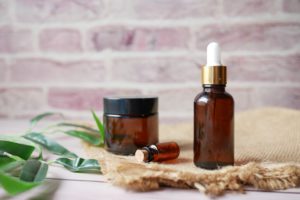The dreaded announcement that comes at the beginning of every flight: “Place your own oxygen mask on first before assisting others.” How many times have you heard this announcement and scoffed? Harvard Business Review states that we cannot take care of other responsibilities or other people without first taking care of ourselves. Despite what many people think, self-care is not selfish. Taking care of yourself, recharging, renewing, resetting and doing activities that bring you joy are essential components for a happy and balanced life.
BATH
Water has cleansing properties, both physical and emotional. Dr. Wallace J. Nichols, marine biologist and water enthusiast, coined the term “Blue Mind” to describe the deep connection between humans and water. In his book “Blue Mind: The Surprising Science That Shows How Being Near, In, On, or Under Water Can Make You Happier, Healthier, More Connected, and Better at What You Do,” Nichols explores the notion that proximity to water can improve our physical and emotional health.
A scientific study by Yoto et al. (2018) randomly assigned subjects to study the physical and emotional differences between bath and shower cleansing. They found that immersion bathing provided better scores for fatigue, stress, pain and smile as well as anxiety, anger and depression.
Run the water, light a candle, play some relaxing music and toss some salts in the bath!
MASSAGE
While massage is a great way to relax and unwind, there are also numerous other health benefits. According to the Mayo Clinic, regular massage can help improve immune function, lower heart rate and blood pressure, improve circulation and reduce stress. Massage can also help some people with headaches, back and neck pain and injury recovery. And you thought it was just a way to pamper yourself!
REIKI
Reiki is a Japanese energy healing practice that is a form of complementary medicine. The Cleveland Clinic states that it is made up of two words – rei, which means “universal,” and ki, which means “life force.” During a reiki session, clients typically lay clothed on a table and the practitioner hovers their hands slightly over the body, sometimes making contact. The purpose of reiki is to redistribute stagnant energy throughout the body and bring it back into balance. Reiki can be used for relaxation, improved mood, assistance with insomnia, minor aches and pains and as an additional modality for symptom improvement for those with medical conditions such as surgery or cancer, according to Everyday Health.
MEDITATE
Meditation is a great self-care method that allows you to quiet the mind. Whether you are sitting cross-legged on the floor or going for a meditative walk, meditation helps you be present in the moment. According to the National Center for Complementary and Integrative Health (NCCIH), meditation has been proven to help with anxiety, depression, insomnia, pain, high blood pressure, gastrointestinal conditions, tobacco cessation as well as possibly menopausal symptoms and attention deficit hyperactivity disorder (ADHD).
Grab a few minutes of quiet and turn off the distractions of the day!
AROMATHERAPY
Have you ever noticed that a scent can immediately alter your mood? Try an essential oil diffuser to tackle whatever mood enhancement you desire, whether it’s a calming or energizing scent. Besides being pleasant to smell, the Cleveland Clinic reports that essential oils have plenty of other health benefits including improved job performance through reduced stress and increased attentiveness, improving sleep, boosting mood, reducing anxiety, relieving headaches and nausea and reducing inflammation.
Plug in that diffuser, add a little oil and water and breathe in!
CONNECT WITH OTHERS
According to Mental Health America, connecting with others produces better health, longer life and increased happiness. Whether it’s going for a walk with a friend, calling to chat or a delicious dinner out on the town, make it a regular routine to connect with your special people who bring positivity into your life.
JOURNAL
Journaling offers us an outlet to write down our thoughts and feelings in a safe, non-judgmental space. Whether documenting your daily activities, exploring emotions, expressing gratitude or creating a checklist, journaling can help relieve stress. By getting all anxious thoughts onto paper, you can feel a certain relief that you’ve expressed yourself. Besides being a simple way to document your feelings, PositivePsychology.com says that journaling can help with anxiety, recovery and stress management.
Grab a pen and paper and write whatever thoughts come to you! If they are deeply personal, store your journal in a safe place to keep your innermost thoughts private.
READ
Doesn’t curling up with a good book and getting lost in the story sound appealing? Healthline states that there are many benefits to reading besides just giving yourself some quiet time. Reading lowers blood pressure and heart rate, helps fight the symptoms of depression, prevents cognitive decline, reduces stress, improves empathy, helps prime the body for sleep, increases vocabulary and reading comprehension, improves brain connectivity and contributes to a longer life.
Studies show that it doesn’t really matter what you read to reap the benefits so grab whatever appeals to you and hit your favorite reading nook or hammock!
FITNESS
We all know that exercise is good for our bodies but did you know it’s also good for your mental health? The American Psychological Association (APA) states that regular exercise helps the body manage stress levels by lower levels of cortisol and epinephrine after exercise. Regular exercise also increases norepinephrine which helps with long-term stress response.
Strap on those sneakers and get moving!
GET OUTSIDE
Ecotherapy is a term used to describe humans’ need to connect with nature and earth and neglecting this part of self-care can have detrimental health effects. Healthline summarizes current research by stating that nature therapy has proven positive effects on resilience, nervous system recovery, post-traumatic stress disorder (PTSD) and improved well-being. One of the reasons that nature may be so energizing is the presence of negative ions. Healthline reports that negative ions may help with depression.
Whether it’s gardening, hiking, working with animals or simply taking a few minutes to sit outside, get out there to refresh and renew!
Pick your favorite self-care strategies and schedule it on your calendar routinely. Taking care of yourself will help you feel refreshed to take care of other people and responsibilities.
MORE SELF-CARE STRATEGIES
• Practice saying “no” to things that don’t make you happy or stress you out.
• Disconnect from social media for a day, week or month.
• Subscribe to a subscription box full of goodies that make you smile.
• Hire someone to help in areas you need like cooking or cleaning.
• Don’t apologize for being you, embrace it!
RELATED ARTICLES
Gout: The Throbbing Pain You Want to Live Without
Are Psychedelic Drugs the Medical Future?
Exploring the Benefits of Eggplant









